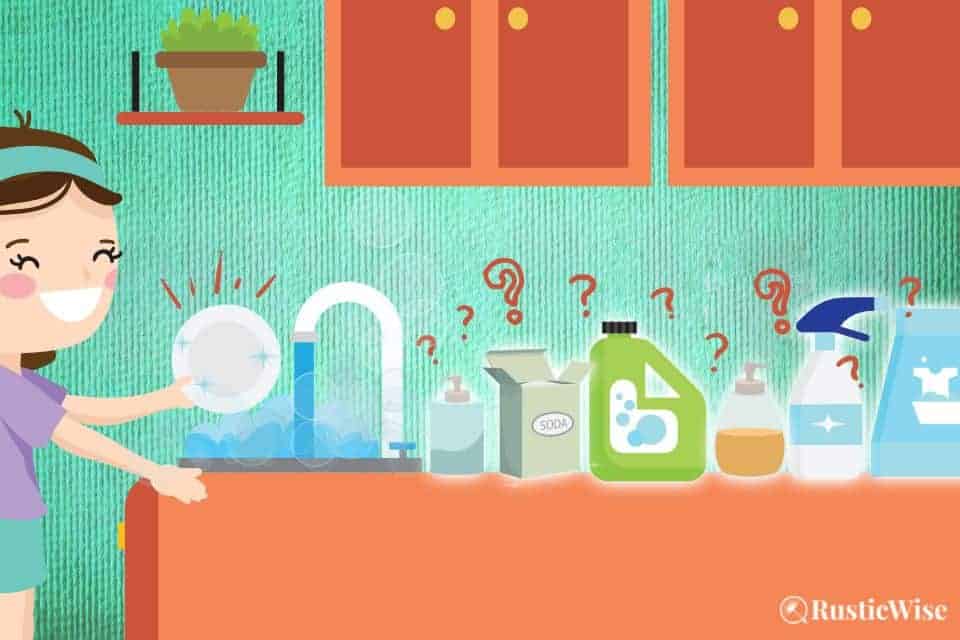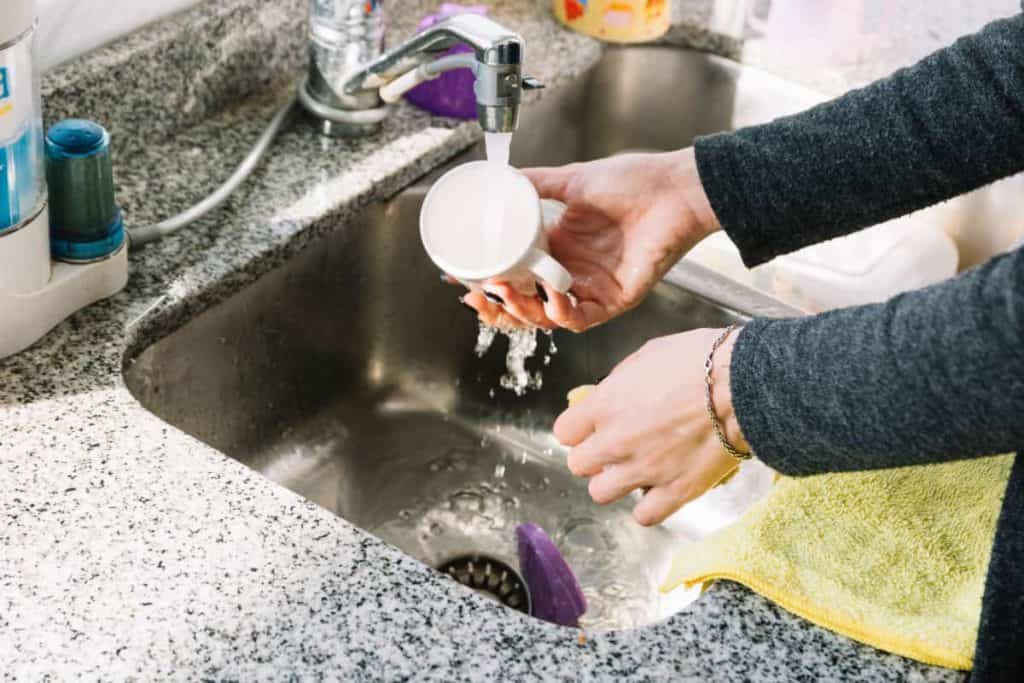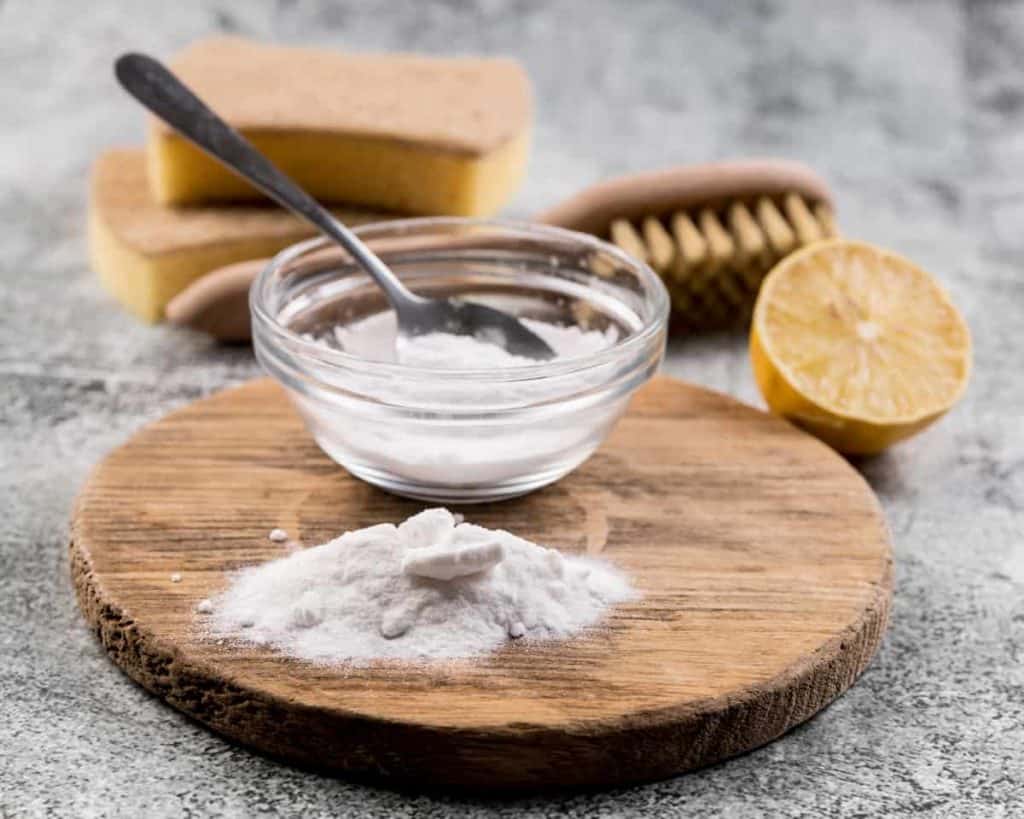Can You Use Hand Soap to Wash Dishes + 3 Ways to Wash With No Dish Soap

Your dishes are stacked high in the kitchen sink, begging to be washed. But you just noticed—you’re out of dish soap. Can you use hand soap to wash dishes? Yes, you can use liquid hand soap if you’re in a pinch, but it’s not as effective at removing grease like dish soap. You might also notice your “clean” dishes are covered in a film from the extra moisturizers in hand soap.
Whether you’re actually out of dish soap, or are just curious about how dish soap actually differs from hand soap, keep reading for a closer look at the science behind washing dishes.
Most hand and dish “soaps” are actually detergents
First things first. Most commercially produced hand soap and dish soap is not actually “soap” in the traditional sense (an alkali base with oils/fats). Rather, the liquid soaps you find on store shelves today are actually synthetic detergents.
Synthetic detergents are made of surfactants that are effective at removing oil and dirt by forming clusters called micelles.
If you read the ingredients label, you’ll find that most store-bought liquid AND dish soaps contain common surfactants known as SLSs, such as sodium lauryl sulfate, or sodium laureth sulfate.
SLSs are used to create that foaming lather combined with cleaning power that we’ve all become accustomed to in liquid soap.
Most dish and hand soaps also contain synthetic fragrances and coloring.
The takeaway: Most commercial soaps (whether for hands or washing dishes) contain many chemicals that aren’t exactly “food-safe” or things you want to ingest. So whether you use dish detergent or hand detergent to scrub those dirty dishes, rinse well! If you have a bottle handy, the best liquid hand soaps are the natural varieties sans coloring, fragrance, or preservatives.

Can you use hand soap to wash dishes? Here’s the scoop
While technically yes, you could wash dishes with hand soap, you might not want to for a few reasons.
You may reason that soap is soap, right? The purpose of soap is to clean, so does it really matter if you use hand soap to wash a few dishes?
Here’s a few reasons why hand soap isn’t great for washing dishes:
- Less effective: Most liquid hand soaps are milder than dish soaps. Hand soaps are designed to be more closely aligned to the natural pH of skin, which is more acidic. Stronger cleaners (such as dish soaps) are more alkaline or basic. If you’re using hand soap to tackle that pile of dirty dishes, you might find that it’s less effective at removing grease.
- May leave a film: Many commercial liquid hand soaps have added skin moisturizers that leave your hands feeling soft. Unfortunately, these extra conditioning ingredients might leave a slippery film on your just-washed dishes.
- More expensive: Most hand soaps are more expensive than liquid dish soaps. So if you’re trying to take a one-bottle-for-all approach by buying only one type of soap, you’re not really saving much money.
Tip: If you need to use hand soap because you ran out of regular dish detergent, rinse extra well to remove any residue!
No, not all soaps are created equal
Synthetic detergents are formulated with different purposes in mind. While they are all meant to clean, they have different ingredients in varying strengths.
- Hand soap mildly cleanses the skin and moisturizes it.
- Dish detergents banish grease.
- Dishwasher detergent contains bleach—not exactly something you want to use on your hands.
- Laundry detergents may also contain bleach along with fabric softeners and fabric brighteners.
What makes liquid dish soap different from hand soap?
Let’s take a closer look at how liquid dish detergent differs from liquid hand detergent.
Hand soap has added skin moisturizers
Most hand soaps contain moisturizers and conditioners to nourish the skin, but aren’t exactly necessary for dishes. (When was the last time your dinner plate needed some extra moisturizer?)
Softsoap, a brand of popular commercial hand soap, contains the following skin conditioners:¹
- Glycerin: “Helps to retain water in a product and the top layers of skin.”
- Hydrogenated jojoba oil: “Helps to remove dead skin cells from the surface of your skin.”
- Prunus Armeniaca (Apricot) Seed Powder: “Helps to remove dead skin cells from the surface of your skin.”
- Zea mays (corn) oil: “Helps to make your skin feel soft and smooth.”
The takeaway: If you use hand soap to wash dishes, you may find your dishes covered in a layer of residue which may be hard to rinse off.
Most hand soaps are more acidic than dish soaps
There’s a wide range of pH levels in both hand soaps and dish soaps.
However, liquid hand soap is milder on hands (more acidic), while dish soap is more alkaline, which makes it better for removing grease and overall cleaning.
For example, here are a few pH levels of hand and dish soaps:
- Dr. Bronner’s Peppermint Pure-Castile Liquid Soap: pH 9–10
- Dawn Ultra Dishwashing Liquid, Original Scent: pH 9.0–9.2
- Homemade hand soap bar: pH 8–10
- Ivory Original Liquid Hand Soap: pH 5.8–7.3
- Dove Beauty Bar: pH 7
- Softsoap Antibacterial Liquid Hand Soap: pH 4.9
So what does having a different pH level have to do with clean dishes?
Notice that the most of the hand soaps (besides Castile soap and homemade soaps) are acidic.
If you remember, the pH scale ranges from 0 to 14. A pH of 7 is neutral; anything below pH 7 is acidic, and anything above pH 7 is alkaline or basic.

Each number change in pH represents a ten-fold increase (or decrease). For example, a soap with pH 9 is ten times more alkaline than a soap with a pH of 8.
The more alkaline a soap is, the more effective at cleaning it is. As you can see, dish soap is much more alkaline than most hand soaps. (Many powerful chemical liquid drain cleaners, for example, have a pH of 13.)
Can you wash dishes with regular bar soap?
Sure, you can use a plain soap bar to wash dishes. Just don’t expect it to foam or bubble like regular liquid dish soap.
To keep things as food-safe as well as natural and organic as possible, choose fragrance-free soaps that are plant-based. A few good choices are olive oil based soaps, or coconut oil soaps.
To wash dishes with bar soap, wet the soap, and lather your dish washing cloth, sponge, or brush before scrubbing.

3 ways to wash dishes when you run out of dish soap
#1: Use a multi-purpose pure Castile soap
If you have a bottle of liquid Castile soap at home, it comes in handy for washing hands and dishes.
On the Dr. Bronner’s website, they recommend diluting their pure Castile soap when hand washing dishes. Use one part Castile to 10 parts water.² Squirt a bit onto your scrubbie and wash away.
If you have hard water, you may find it handy to dip your Castile-washed dishes in a vinegar soak. Make a solution of 1 cup white vinegar to 1 quart of water. This helps remove any film to get a sparkly clean dish.³
#2: Make a baking soda paste
Baking soda is a great natural cleaner and mild abrasive. Make a paste by combining 1/2 cup of baking soda with 2–4 tablespoons of water. Apply the paste to your dirty pots and dishes and follow up with a thorough rinse.
#3: A good hot water soak
If your dishes aren’t too greasy, a simple hot water bath might do the trick. Fill your sink with hot water and let the dishes soak for about 20 minutes before scrubbing clean.
Of course, this method isn’t as great as using a proper soap.
Can you use dish soap to wash your hands?
Yes, using dish soap to wash your hands will effectively remove bacteria, but it might dry your skin in the long run. This is because the ingredients used in dish soap are designed to remove grease from dirty dishes and may leave skin feeling dry or irritated.
Follow up with a good hand moisturizer.
If you stock up on bar soap, or make your own natural homemade soap, you won’t have to worry about running out of soap!
Is antibacterial soap better than regular soap?
According to the U.S. Food & Drug Administration (FDA), you don’t really need antibacterial hand soap for regular, everyday use.⁴ While the FDA is mostly referring to hand soaps, the same principal also applies to dish soaps.
Studies show that proper handwashing technique using plain soap is effective at killing 82 percent of bacteria.⁵
Most dish soaps don’t contain antibacterial ingredients (unless they are specifically labelled as antibacterial).
And in most cases, you don’t really need your dishes free of all bacteria. Keep in mind that bacteria is everywhere and most of it is harmless. Regular liquid dish soap is effective at reducing surface tension between food/oil particles and water, making them easier to scrub clean.
For those times when you truly want to disinfect your dishes, it’s best to stick them in the dishwasher in the hot cycle. If you have a “sanitize” cycle, then your dishes should be free of harmful bacteria once they’re sparkly clean.

References
- Softsoap, Ingredients Guide, https://www.softsoap.com/en-us/ingredients-guide. Accessed January 2022.
- Dr. Bronner’s, Dilutions Cheat Sheet for Dr. Bronner’s Pure-Castile Soap, https://www.drbronner.com/all-one-blog/2017/06/dilutions-cheat-sheet-dr-bronners-pure-castile-soap/. Accessed January 2022.
- Abramson, Ashley (16 October 2018). “Don’t Fall for These 6 Common Castile Soap Cleaning Mistakes,” Apartment Therapy. Accessed January 2022.
- U.S. Food & Drug Administration (FDA), “Antibacterial Soap? You Can Skip It, Use Plain Soap and Water,” https://www.fda.gov/consumers/consumer-updates/antibacterial-soap-you-can-skip-it-use-plain-soap-and-water. Accessed January 2022.
- Rangel, Gabriel (09 January 2017), “Say Goodbye to Antibacterial Soaps: Why the FDA is banning a household item,” Harvard University. Accessed January 2022.

Author: Theresa Tesolin
Theresa is co-founder of RusticWise. She helps people unleash their inner DIY spirit by encouraging them to get dirty and make or grow something from scratch.









